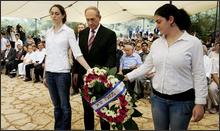Israel buries Zionism founder’s children
 sraeli Prime Minister Ehud Olmert lays a wreath for Hans and Pauline Herzl at Mount Herzl cemetery in Jerusalem (AP Photo/Gali Tibbon, Pool)
sraeli Prime Minister Ehud Olmert lays a wreath for Hans and Pauline Herzl at Mount Herzl cemetery in Jerusalem (AP Photo/Gali Tibbon, Pool)
JERUSALEM — Nearly eight decades after their tragic deaths, two of Theodor Herzl’s children were buried Wednesday in Jerusalem in an official ceremony that fulfilled the founder of modern Zionism’s century-old will.
The funeral, in the national cemetery that bears Herzl’s name, followed years of bureaucratic battles and a religious controversy about whether Herzl’s son – who converted to Christianity and who committed suicide – was entitled to a proper Jewish burial.
Pauline and Hans Herzl were buried near their father in a midafternoon Jewish funeral after their remains were brought to Israel from Bordeaux, France, where they were disinterred earlier this week. Hundreds of national dignitaries and very distant Herzl relatives sat under a canopy during the hourlong ceremony.
“Today, by bringing the bones of Pauline and Hans, we are completing the mission and closing a historic circle,” Prime Minister Ehud Olmert said at the ceremony. “We owe (Herzl) a humane debt, a debt of honor, and that is the complete fulfillment of his will.”
Herzl, a European journalist and author, was deeply affected by the Dreyfus Affair in 1895, when a Jewish military officer in France was wrongly convicted of espionage. Herzl felt the scandal was driven by virulent anti-Semitism and decided that Jews needed their own nation.
The following year, Herzl published his seminal work, “The Jewish State.” He later founded the World Zionist Organization, which spearheaded Israel’s establishment.
Herzl, who died in 1904 at age 44, was buried in Vienna, Austria, but specified in his will that he wanted his body, and those of his close relatives, moved to the Jewish state he hoped would one day be created.
In 1949, a year after Israel’s independence, Herzl’s body was brought to Jerusalem and buried in the Mount Herzl Cemetery, which later became the final resting place of Israel’s leaders and war heroes. The bodies of Herzl’s parents and sister were brought later, but not those of his children.![]()
All three died tragically. Pauline suffered from mental illness and died in 1930, at the age of 40, apparently of a morphine overdose. Hans, who converted to Christianity, committed suicide when he learned of her death. He was 39.
Herzl’s youngest daughter, Trude, died in a Nazi concentration camp during the Holocaust at the age of 50. Her body was never found.
Jewish prohibitions against suicide, plus Hans’ conversion to Christianity, initially deterred rabbinic authorities from bringing Herzl’s children to Israel, and the idea was shelved in the 1950s.
A century after his death, Herzl’s legacy looms large in Israel. National monuments, countless roads and even a town – Herzliya – bear his name.
Yet his will remained unfulfilled until the historian Ariel Feldestein began researching it in 2000 and pressing for its implementation.
The new initiative got bogged down by bureaucracy and the objections of ultra-Orthodox lawmakers, until Feldestein presented evidence that Hans had returned to Judaism later in life and was ultimately buried in a Jewish cemetery in France.
Shlomo Amar, one of Israel’s chief rabbis, issued a recent religious ruling allowing for the reburial, saying the conversion to Christianity was conducted under conditions of great sorrow and therefore not valid.
Regardless, several religious officials objected and refused to attend the funeral.
“There is no reason that they should be different from anybody else,” said Moshe Gafni, an ultra-Orthodox lawmaker. “This is someone who converted and committed suicide. This is no message to send.”
But with Olmert’s support and Amar’s blessing, the Jewish Agency, a quasi-governmental body that deals with the Jewish Diaspora, began making arrangements for Wednesday’s bittersweet ceremony.
“Ladies and gentlemen, we came here today to carry out justice – Jewish justice, historic justice, Zionist justice and, above all, humanitarian justice,” said Jewish Agency Chairman Zeev Bielski.
David Breakstone, head of the Herzl Museum in Jerusalem, said bringing Herzl’s children to Israel – despite their flaws – showed a maturation of the Jewish state’s relations with its ideological founder, who it is now able to see as a human being, instead of a legend.
“As we are fulfilling this aspect of Herzl’s legacy, on the personal level, I think it needs to be a reminder for all of us of the other part of his legacy that has yet to be fulfilled, which is creating the exemplary, model society that he envisioned in building this state,” he said.
 Contact aron
Contact aron RSS SUBSCRIBE
RSS SUBSCRIBE ALERT
ALERT